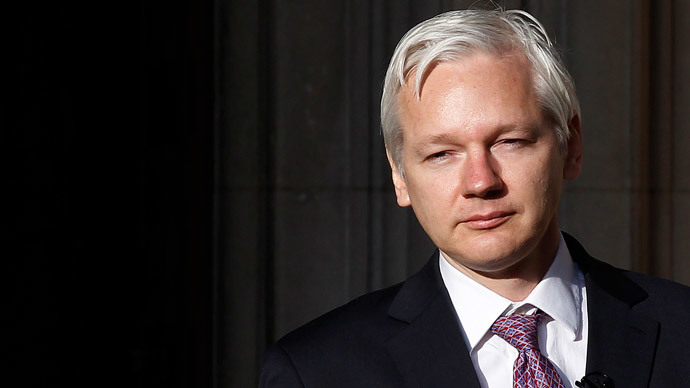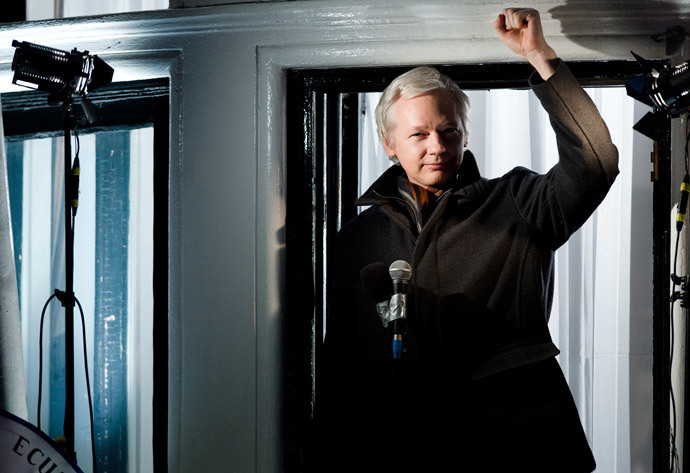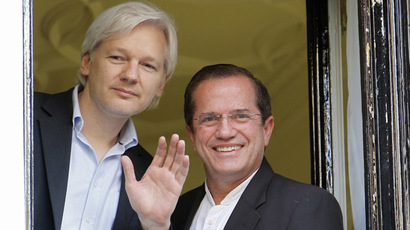Assange lawyers demand end to arrest warrant, release of evidence

Julian Assange’s lawyers are demanding Swedish prosecutors reveal texts from the woman in the ‘rape’ scandal, currently hanging over the WikiLeaks founder. Changes in the law allow this and the defense team is appealing to cancel the arrest warrant.
"There is now a law which says that prosecutors in Sweden must give an account of the material they are using to build their case, and we have not seen that material yet," Thomas Olsson and Per E. Samuelson, Assange's lawyers, told Sveriges Radio, as cited by The Local.
Legislation from June 1 says that a suspect has the right to be made aware of "all the circumstances that have influenced a court's decision," said Bengt Ivarsson, president of the Swedish Bar Association.
Olsson and Samuelson believe that it could help them gain access to text messages that were sent by the girls who were allegedly raped by the WikiLeaks founder.
"The messages strongly suggest that there is no basis for the arrest and they are thus vital, so that he [Assange] can effectively tackle the arrest warrant," the defense lawyers wrote in an official request on Tuesday.
According to Olsson, the arrest warrant should be rescinded as it cannot be enforced while Assange is in the Ecuadorian embassy in London, and Sweden won’t consider the possibility of questioning the WikiLeaks founder in the UK’s capital.
"In light of the significant impact this has on Assange's ability to move freely and to live a normal life, we think that it is unreasonable to uphold the decision," he told Reuters. "As I see it, the arguments for the unreasonableness of the situation are very strong, so we have very strong hopes that the court will change the decision."

Samuelson believes that "the new law gives [the defendants] more power."
"In 2011, we were allowed to read them and memorize them, but we do not have the full messages," he added.
Assange, NY forum talk Orwellian future, internet as 'suppression' tool
Assange has been trapped at the Ecuadorian Embassy in London, where he received political asylum in 2012, after Swedish authorities issued a warrant for his extradition. He is wanted in Sweden for questioning over allegations of the rape and sexual assault of two women. Assange has vehemently denied all the charges.
According to the WikiLeaks frontman, the accusations are politically motivated and Sweden will hand him over to the US if he is extradited.
Assange wrote in his affidavit that one of the women did not intend to press charges against him.
“While the younger woman was at the police station on 20 August 2010, her phone records show that she wrote that she did not want to press any charges on JA [Julian Assange], but that the police were keen on getting a grip on him,” says the statement from the affidavit.
The woman said she was “shocked when they arrested JA because she only wanted him to take a test” and later told a friend that she felt that she had been “railroaded by police and others around her.”
According to the younger woman's phone records: “I did not want to accuse JA for anything… it was the police who made up the charges.”
FBI has an active criminal case against WikiLeaks’ Assange – court documents
The US Department of Justice opened an investigation into the activities of WikiLeaks in 2010, after it published US military and diplomatic documents leaked by Chelsea Manning (formerly PFC Bradley Manning) in Iraq. Manning has since been charged under the Espionage Act and sentenced to 35 years in prison.














